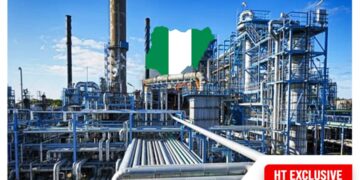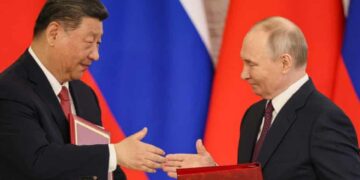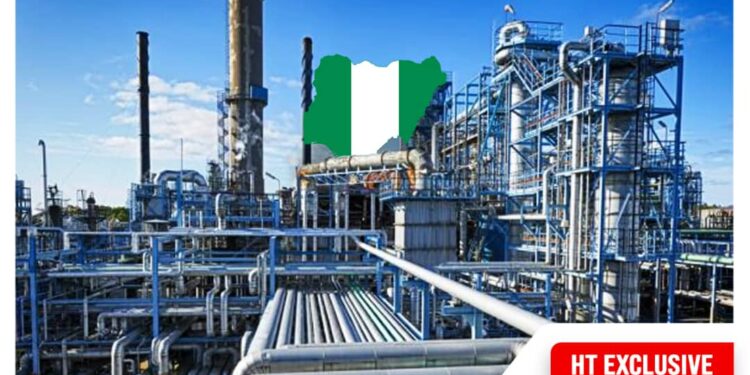By Emmanuel Nduka
Last Friday, Nigeria’s Federal Executive Council (FEC) commanded by President Bola Tinubu approved a $21 million investment fund to install digital meters across all 187 crude oil flow stations in the country’s oil-rich Niger Delta Region. The move, the government said, is to enhance transparency and accountability in crude oil production and export. Vessels will be tracked and monitored from their point of origin up till their final destinations worldwide, Heineken Lokpobiri, Nigeria’s Minister of Petroleum Resources (Oil), told newsmen shortly after the Council’s last meeting.
Expected to be completed within 180 days as directed, the project is set out to guarantee that all 187 crude oil flow stations are fully functional and productive. “There was a contract awarded for us to meter all flow stations that will give us a proper account of what we produce and what we export. It is a major development that has never happened in this country,” the minister said.
Years Of Dip In Output
Nigeria’s crude oil output has dipped significantly over the years. As at mid-2024, Nigeria’s daily crude oil production stood approximately between 1.25 to 1.28 million barrels per day (bpd). The figure falls below the country’s target of 1.83 million bpd for the 2024 fiscal year, and is also below the country’s OPEC quota of 1.5 million bpd. In the last 10 years, Nigeria’s OPEC quota decreased from around 1.75 million barrels per day in 2014, to approximately 1.38 million barrels per day in 2024. This represent a drop of about 370,000 (21%) barrels per day.
This reduction in output is attributed to various operational and technical issues, including pipeline vandalism and oil theft. With a total of 1,481 oil wells in operation according to the Department of Petroleum Resources (DPR), the Nigerian National Petroleum Company (NNPC) Ltd in December last year said illegal oil refiners connected at least 4,800 pipelines on its over 5,000 kilometres of oil pipeline across the country.
$21m For 187 Flows, Over-bloated Allotment?
According to findings made by Heritage Times HT, the average price for metering systems at crude oil flow stations varies significantly based on the type, accuracy, and complexity of the system. Generally, the cost hovers around at least $50,000 per unit. High-end systems, which offer more precise measurements and advanced features, may cost even more. The most common suppliers/manufacturers are America’s Emerson Electric Co, Sweden’s ABB Ltd, or Germany’s Siemens. Meanwhile, the approved $21 million for installing metering systems at 187 crude oil flow stations averages to approximately $112,299 per metering system.
Industry experts/stakeholders are worried about the number of fields functioning out of the 187, and if the abandoned fields that are nonoperational will be metered as well.
The Good Side Of The Story
If the initiative is decently executed, it could portend a base to build confidence of investors and guarantee safer environment. The same system worked in Saudi Arabia. Saudi Arabia’s Saudi Aramco began installing metering systems for its oil fields in the early 1960s. These systems were crucial for accurately measuring and monitoring the production and flow of oil.
The successes in Saudi Arabia’s metering yielded: accurate measurement/revenue calculation; operational efficiency; regulatory compliance; enhanced reservoir management; improved safety and reliability.
Complicity Of Security Operatives
Crude oil theft is systematic, starting from the point of loading to the point of unloading. Metering will largely reduce oil theft. Like experts have noted, all stolen crude in the Niger Delta region transits through one path – the Atlantic Ocean via the Niger Delta; it must also be loaded onto a stationary ship that drops anchor for hours, and then is trans-shipped. These ships are not camouflaged, or invincible. They are domiciled on Nigerian territorial waters. Real time metering plus surveillance is long overdue for Nigeria’s upstream and downstream sectors. It must be installed and managed by independent non-state actors to succeed.
Local Newspaper- Peoples Gazette had in January this year alleged in an Exclusive Report that Nigeria’s Chief of Naval Staff, Vice Admiral Emmanuel Ogalla was stifling inquiries into allegations of facilitating an unorganized bunkering of Nigerian crude and a multimillion-naira contract-splitting fraud. In the Report, Ogalla was also accused of releasing several oil tankers impounded for transporting stolen crude oil off Nigerian shores after receiving kickbacks in millions of dollars.
Nigeria’s Minister of State for Defence, Bello Matawalle, had said the allegations against Ogalla would be investigated.
Responding, the Nigerian Navy, in a statement by the Director of Information, Rear Admiral Adedotun Ayo-Vaughan on January 27 denied the allegations against the Naval Chief. He said the arrested vessels mentioned in the report were involved in crude oil theft and illegal oil bunkering, noting that they have not been released as alleged. “Indeed, all arrested vessels mentioned in the publication that were involved in crude oil theft and illegal oil bunkering are being investigated and none of such vessels has been released as alleged,” the Navy said.



































